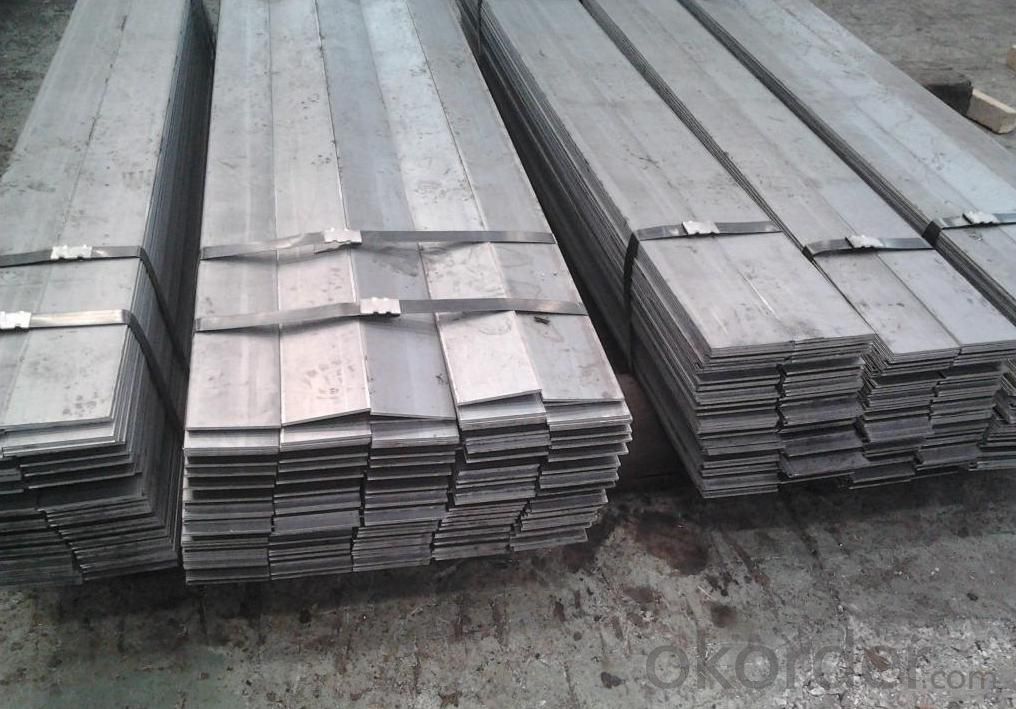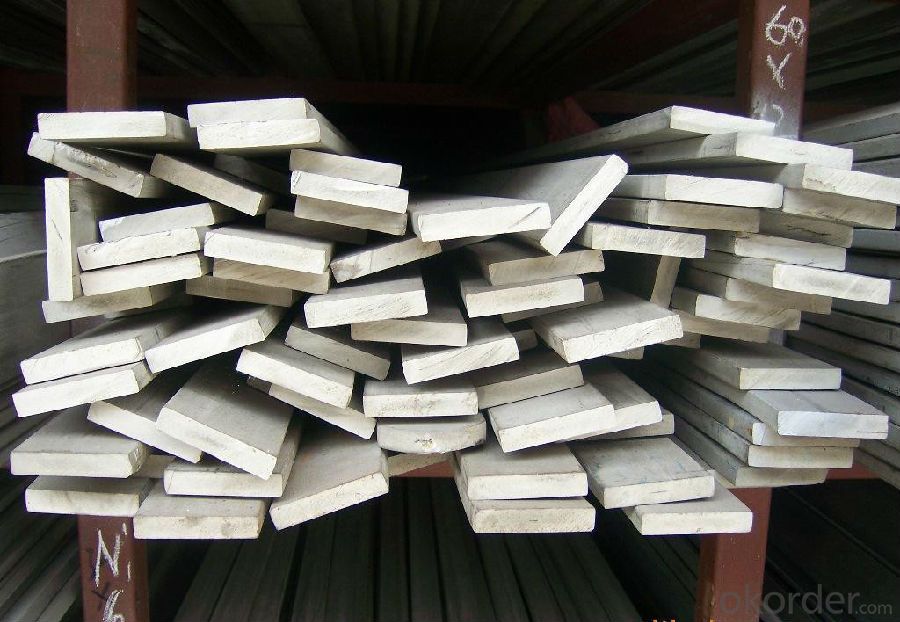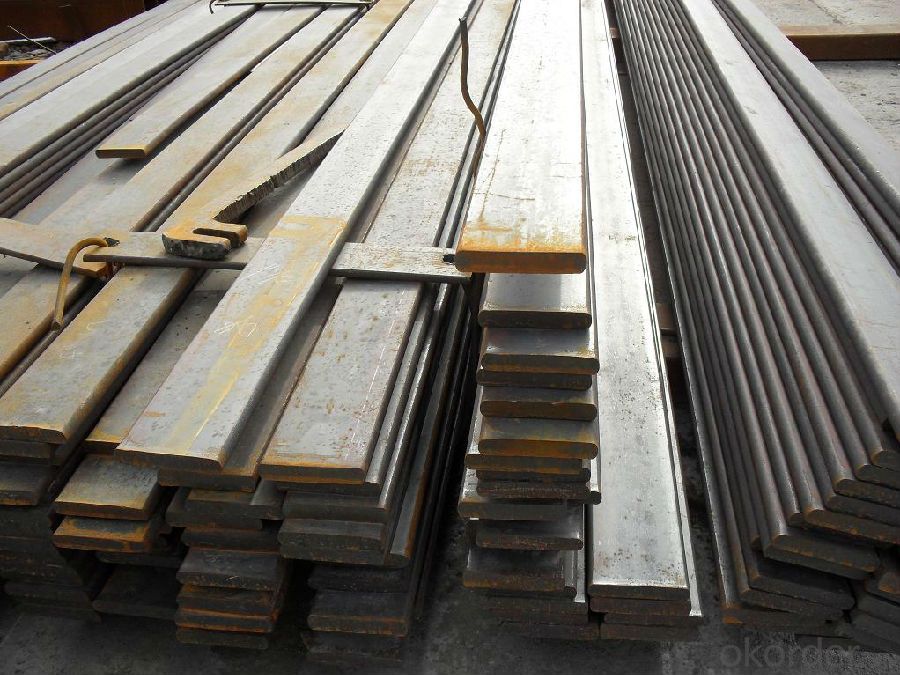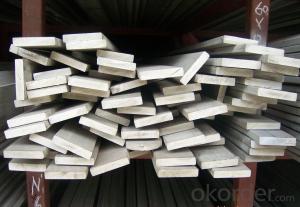Spring Flat Steel 65Mn for laminated Leaf Spring
- Loading Port:
- Tianjin
- Payment Terms:
- TT OR LC
- Min Order Qty:
- 25 m.t.
- Supply Capability:
- 50000 m.t./month
OKorder Service Pledge
OKorder Financial Service
You Might Also Like
Item specifice
Spring Flat Steel 65Mn for laminated Leaf Spring
Product Description:
Measurement | Thickness | Width |
6mm~35mm | 40mm~150mm | |
Edge(Cross Section) | round edge profile to DIN59145 | Square edge profile to DIN59146 |
Bundle Weight | Around 2.0 MT | |
Technique | Hot Rolled | |
Surface | Grooved | Plain-smoothed |
Quenchant | Oil/Water | |
Temper Stressing | 480°C-560°C | |
Quenching Temprature: | 800°C-1000°C | |
OEM | Material Composition Offered by Customers | |
Application | sup9/sup9a/sup10/55Cr3/50CrV4 | Automotive suspension springs |
sup7/9260/30CrMnB/27CrMnB | Rotary tools and Blades | |
Payment Term | 100% L/C at Sight. | 30% T/T Down Payment, Balance Against B/L Copy. |
Packing | In bundles. Each bundle packed with 2 steel strips and 3 steel wires. | |
Features of 65Mn Spring Steel:
Certificated by ISO9001:2008. Highly Acclaimed Manufacturer
By fostering team-work and trust, with a commitment to quality and deliver.
By reliable conditions and services to build outstanding relationship with our customers.
By continuously improving our technology, processes, products and services
Useage of 65Mn Spring Steel:
This product has characteristics of good metallurgical quality such as high purity and uniformity, good surface quality by strictly controlling surface defect and decarburization, good mechanical properties especially on elastic limit, strength limit and tensile ratio, as well as accurate shape and dimension.
Product show:



- Q:How is high-strength alloy steel used in the production of structural components?
- High-strength alloy steel is commonly used in the production of structural components due to its exceptional strength-to-weight ratio. It provides superior tensile strength and toughness, making it suitable for supporting heavy loads and withstanding high stress and impact. This steel is often used in the construction of buildings, bridges, and other infrastructure, as well as in the manufacturing of machinery and vehicles. Its application helps enhance structural integrity, durability, and safety while minimizing the weight and material requirements of these components.
- Q:How does special steel contribute to the heavy equipment industry?
- Special steel contributes to the heavy equipment industry by offering enhanced strength, durability, and resistance to wear and tear. It enables the production of high-performance components and parts, such as gears, axles, and blades, that can withstand heavy loads, extreme temperatures, and harsh environments. The use of special steel in heavy equipment ensures improved safety, increased productivity, and longer service life, making it a critical material for the industry.
- Q:Is special steel recyclable?
- Yes, special steel is recyclable.
- Q:What are the magnetic properties of special steel?
- Special steel can exhibit a range of magnetic properties, depending on its composition and treatment. Some special steels, such as austenitic stainless steel, are non-magnetic due to their high nickel content. On the other hand, certain types of special steel, like ferritic or martensitic stainless steel, can be magnetic. Additionally, some special steels can be made magnetic through processes like heat treatment or cold working. Therefore, the magnetic properties of special steel can vary and are influenced by several factors.
- Q:How does special steel compare to other high-performance materials?
- Special steel, being a high-performance material itself, offers several advantages over other high-performance materials. Its exceptional strength, durability, and resistance to corrosion make it a preferred choice in various industries. Furthermore, special steel can withstand extreme temperatures and pressures, making it ideal for applications that demand reliability and performance under challenging conditions. In terms of cost-effectiveness, special steel often proves to be more economical compared to other high-performance materials. Overall, special steel's unique combination of properties sets it apart and makes it a reliable and versatile option in comparison to other high-performance materials.
- Q:How does special steel contribute to the telecommunications industry?
- Special steel plays a crucial role in the telecommunications industry by providing the necessary materials for the production of various components such as cables, connectors, and transmission towers. It offers exceptional strength, durability, and resistance to corrosion, allowing for reliable and long-lasting infrastructure. Whether it's in the form of high-tensile steel wires for cables or corrosion-resistant steel for towers, special steel ensures efficient and uninterrupted communication networks, supporting the growth and advancement of the telecommunications industry.
- Q:How does special steel contribute to reducing product weight while maintaining strength?
- Special steel contributes to reducing product weight while maintaining strength through its unique properties and composition. Special steel is engineered with specific alloying elements, such as chromium, nickel, and molybdenum, that enhance its strength and durability. This allows manufacturers to use thinner and lighter steel components without compromising structural integrity or performance. Additionally, special steel can be heat-treated to further enhance its strength-to-weight ratio. By utilizing special steel, products can be designed with reduced weight, resulting in improved fuel efficiency, increased payload capacity, and overall cost savings.
- Q:How is special steel used in the construction supply chain?
- Special steel is used in various ways in the construction supply chain. It is commonly used in the production of high-quality tools and equipment used in construction, such as drills, saws, and hammers. Special steel is also utilized in the manufacturing of structural components, such as beams and columns, which provide strength and durability to buildings and infrastructure projects. Additionally, it is used in the production of reinforcing bars and wire mesh, which reinforce concrete structures and ensure their stability. Overall, special steel plays a crucial role in enhancing the performance and safety of construction materials and products in the supply chain.
- Q:What are the requirements for special steel used in packaging machinery?
- The requirements for special steel used in packaging machinery can vary depending on the specific application and the type of packaging machinery being used. However, there are some common requirements that are typically expected for this type of steel. Firstly, the special steel used in packaging machinery should have excellent corrosion resistance. This is because packaging machinery often comes into contact with various liquids, including water, oils, and cleaning solutions. Corrosion resistance helps to prevent the steel from deteriorating or rusting when exposed to these substances, ensuring the longevity and reliability of the machinery. Secondly, the steel should possess high hardness and wear resistance. Packaging machinery often involves moving parts and components that are subjected to constant friction and wear. Therefore, the steel used in these parts should be able to withstand the repetitive contact and abrasion without undergoing significant wear or deformation. High hardness also helps to prevent the formation of scratches or grooves on the surfaces, which can compromise the quality of the packaging. Additionally, the special steel should have good machinability and formability. Packaging machinery often requires complex shapes and intricate designs, so the steel should be easily machinable and capable of being formed into the desired shapes and sizes. This facilitates the manufacturing process and allows for the creation of precise and accurate components. Furthermore, the steel should possess high tensile strength and toughness. Packaging machinery may be subjected to mechanical stresses and impacts during operation, and the steel used in its construction should be able to withstand these forces without fracturing or breaking. High tensile strength ensures the structural integrity of the machinery, while toughness helps to prevent the formation of cracks or fractures under sudden loads or impacts. Lastly, the special steel used in packaging machinery should be cost-effective and readily available. The cost of the steel should be reasonable and within the budget of the manufacturer, without compromising the quality or performance of the machinery. Additionally, the steel should be readily available in the market to ensure a continuous supply for manufacturing purposes. Overall, the requirements for special steel used in packaging machinery include corrosion resistance, high hardness and wear resistance, good machinability and formability, high tensile strength and toughness, and cost-effectiveness. Meeting these requirements ensures the durability, reliability, and efficiency of the packaging machinery in various industrial applications.
- Q:What are the different methods for case hardening special steel?
- There are several methods for case hardening special steel, including carburizing, nitriding, carbonitriding, and induction hardening. Carburizing involves heating the steel in a carbon-rich environment to allow carbon atoms to diffuse into the surface, creating a hardened outer layer. Nitriding, on the other hand, involves introducing nitrogen to the steel's surface, resulting in a hard and wear-resistant layer. Carbonitriding combines both carbon and nitrogen to create a hardened surface with improved wear and corrosion resistance. Lastly, induction hardening utilizes an electromagnetic field to heat and harden specific areas of the steel, providing localized hardness and strength.
1. Manufacturer Overview |
|
|---|---|
| Location | |
| Year Established | |
| Annual Output Value | |
| Main Markets | |
| Company Certifications | |
2. Manufacturer Certificates |
|
|---|---|
| a) Certification Name | |
| Range | |
| Reference | |
| Validity Period | |
3. Manufacturer Capability |
|
|---|---|
| a)Trade Capacity | |
| Nearest Port | |
| Export Percentage | |
| No.of Employees in Trade Department | |
| Language Spoken: | |
| b)Factory Information | |
| Factory Size: | |
| No. of Production Lines | |
| Contract Manufacturing | |
| Product Price Range | |
Send your message to us
Spring Flat Steel 65Mn for laminated Leaf Spring
- Loading Port:
- Tianjin
- Payment Terms:
- TT OR LC
- Min Order Qty:
- 25 m.t.
- Supply Capability:
- 50000 m.t./month
OKorder Service Pledge
OKorder Financial Service
Similar products
New products
Hot products
Hot Searches
Related keywords





























